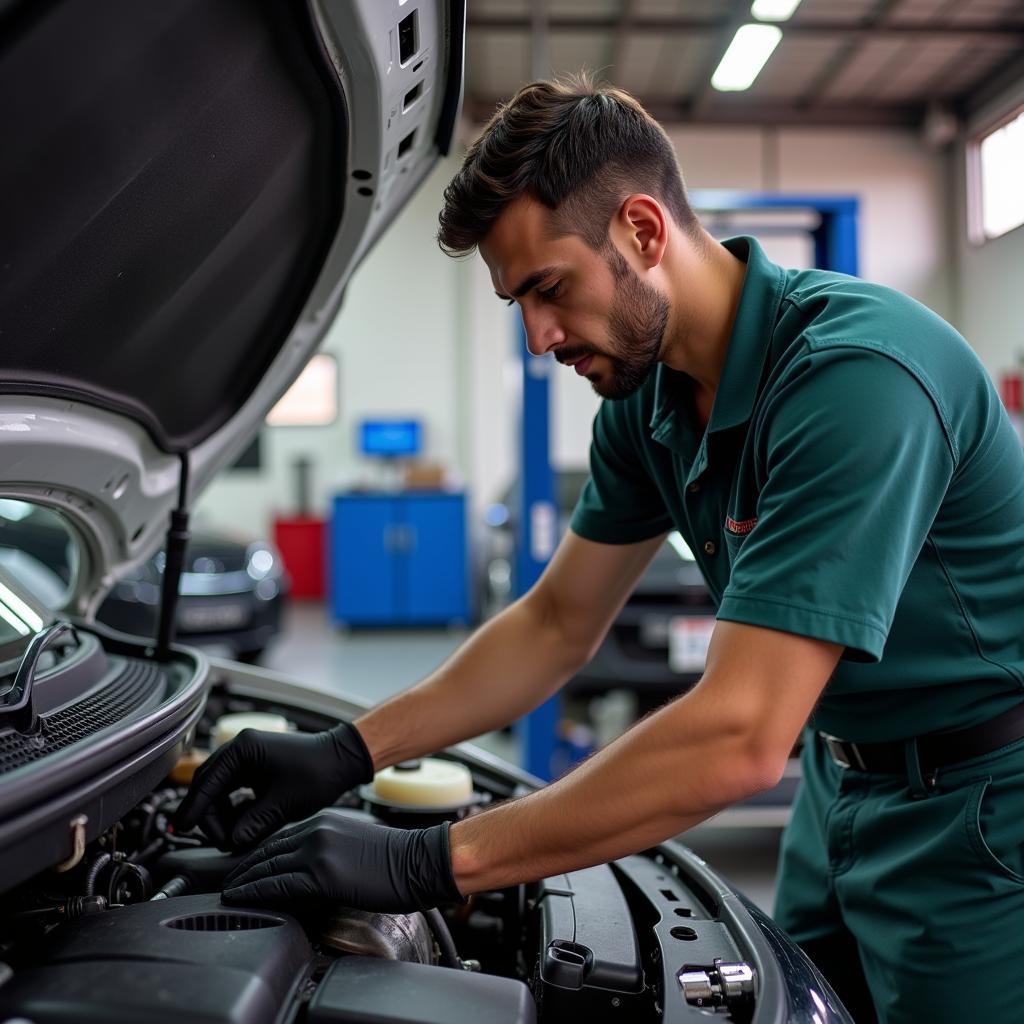Car Pistons Problems can be a real headache for any car owner. From subtle knocks to catastrophic engine failures, piston issues can manifest in various ways, often leaving drivers stranded and facing costly repairs. This guide aims to equip you with the knowledge to identify, understand, and address car piston problems, empowering you to keep your engine running smoothly.
Understanding the Vital Role of Pistons
Pistons are the heart of your engine, converting the expanding gases from combustion into the reciprocating motion that ultimately drives your wheels. These cylindrical components operate under extreme conditions, enduring high temperatures, pressures, and constant friction. When pistons malfunction, the entire engine’s performance is compromised.
Common Symptoms of Car Piston Problems
Recognizing the early signs of piston trouble can save you time and money. Here are some key symptoms to watch out for:
- Knocking Sounds: A rhythmic knocking or tapping sound, especially during acceleration or deceleration, often indicates piston slap, which occurs when the piston has excessive clearance within the cylinder.
- Reduced Power: Worn or damaged pistons can’t effectively compress the air-fuel mixture, resulting in a noticeable loss of power and acceleration.
- Excessive Oil Consumption: Damaged piston rings can allow oil to leak into the combustion chamber, leading to increased oil consumption and bluish exhaust smoke.
- Overheating: A seized piston can prevent the engine from turning, causing rapid overheating.
- Rough Idle: Uneven idling can be a sign of piston or cylinder wear.
A simple issue like a worn-out piston ring can escalate into a major engine overhaul if left unattended. cars-for-sale-with-engine-problems can provide insights into the potential costs associated with engine problems.
Diagnosing Car Pistons Problems
Diagnosing piston problems requires a systematic approach. A compression test is a crucial first step, measuring the pressure within each cylinder to identify potential leaks or weaknesses. A leak-down test can pinpoint the source of the leak, whether it’s through the piston rings, valves, or head gasket. Visual inspection of the pistons, often requiring engine disassembly, can reveal damage like scoring, cracks, or excessive wear.
What Causes Car Piston Problems?
Several factors contribute to car piston problems. Pre-ignition or detonation, caused by incorrect fuel octane or excessive heat, can damage the piston crown. Lack of lubrication or contaminated oil can accelerate wear and tear. Overheating, often stemming from cooling system issues, can lead to piston seizure.
“Regular maintenance, including oil changes and cooling system checks, is crucial for preventing piston problems,” advises John Miller, a seasoned automotive engineer with over 20 years of experience.
Repairing and Preventing Car Piston Problems
Addressing car piston problems typically involves replacing the damaged pistons and rings. In some cases, honing the cylinders or even rebuilding the engine might be necessary. Preventative measures are essential to avoid future piston issues. These include:
- Regular Oil Changes: Use the recommended oil type and change it according to the manufacturer’s schedule.
- Cooling System Maintenance: Ensure the cooling system is functioning correctly to prevent overheating.
- Using the Correct Fuel: Use the recommended octane rating to avoid pre-ignition and detonation.
- Avoiding Engine Overloads: Don’t consistently push your engine to its limits.
Understanding the dynamics of a crankshaft can also shed light on the interconnectedness of engine components. Explore more about crankshafts on a car math problem using vectors.
Conclusion: Keeping Your Pistons Pumping
Car piston problems can range from minor annoyances to major engine failures. By understanding the symptoms, causes, and preventative measures, you can keep your pistons pumping and your car running smoothly. For further assistance or specialized advice, connect with AutoTipPro at +1 (641) 206-8880 or visit our office at 500 N St Mary’s St, San Antonio, TX 78205, United States. “Addressing engine issues proactively can significantly extend the life of your vehicle,” says Sarah Chen, a leading automotive consultant. brake-problems-car-mechanic-simulator offers another perspective on troubleshooting car issues.
“Ignoring seemingly minor engine problems can lead to costly repairs down the road,” adds David Lee, a veteran mechanic. common car engine problems after hurricanes discusses how even external factors can impact your engine’s health. Don’t let car piston problems sideline you. Take proactive steps to maintain your engine’s health and enjoy a smooth, reliable ride.
FAQ
- How much does it cost to replace a piston?
- What are the signs of a cracked piston?
- Can I drive with a bad piston?
- How long do pistons last?
- How do I prevent piston slap?
- What is the difference between a piston and a piston ring?
- What happens if a piston breaks?





Leave a Reply